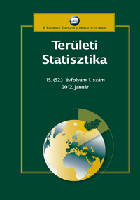A budapesti várostérség fogyasztási alapú ökológiai lábnyomának változása 2003 és 2013 között
Changes in the household consumption-based ecological footprint of Budapest metropolitan region between 2003 and 2013
Author(s): Gábor Harangozó, Zoltán Kovács, Attila Csaba Kondor, Balázs SzabóSubject(s): Social Sciences, Economy, Geography, Regional studies
Published by: Központi Statisztikai Hivatal
Keywords: suburbanization; sustainable development; ecological footprint; environmentally extended input-output analysis; Budapest Metropolitan Region
Summary/Abstract: In this paper, the environmental impacts of the transformation of the Budapest metropolitan region are studied between 2003 and 2013, through the ecological footprint indicator. The socio-spatial structure of the Budapest metropolitan region, like that of other major urban agglomerations in East Central Europe, has gone through substantial changes since the regime change, when the young,affluent strata started to move from the core city to the suburban zone. The quickly growing population of suburbs, with higher level of consumption has resulted in a regional reshuffle of the ecologica lfootprint of the urban region. In this paper, beyond estimating the direct household ecological footprint, the indirect household footprint is calculated,embedded in the total life-cycle of goods and services (raw material extraction, processing, transportation,waste management) consumed byhouseholds, using an environmentally extended input-output model. Although the indirect, embedded household footprint decreased by 11% in Hungary between 2003and 2013, it increased by 6% in Budapest and by8% in the suburban zone. It is mainly the outcome of population growth in the suburban area and the increase in per capita consumption in Budapest. The direct household ecological (carbon) footprint of the suburban zone was double the value of Budapest in 2013. This was mainly due to the higher heating footprint (due to spreading wood combustion),whereas, there was no significant difference regarding the carbon footprint of fuels used by vehicles. Based on total household ecological footprint (that amounted to 2,5 gha/capita in Budapest and 2,8 gha/capita in the suburban zone), it seems that the ecological footprint of the metropolitan region is extremely concentrated in the metropolitan region, in 2013 it exceeded the available biocapacity by 32-fold (in 2003 by 37-fold) in Budapest and by 2.4-fold (in 2003 by 2,2-fold) in the suburban zone.
Journal: Területi Statisztika
- Issue Year: 59/2019
- Issue No: 01
- Page Range: 97-123
- Page Count: 27
- Language: Hungarian

